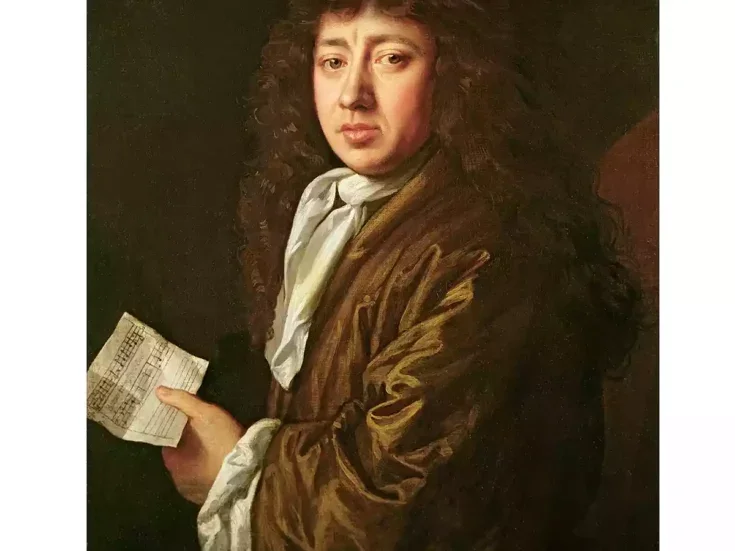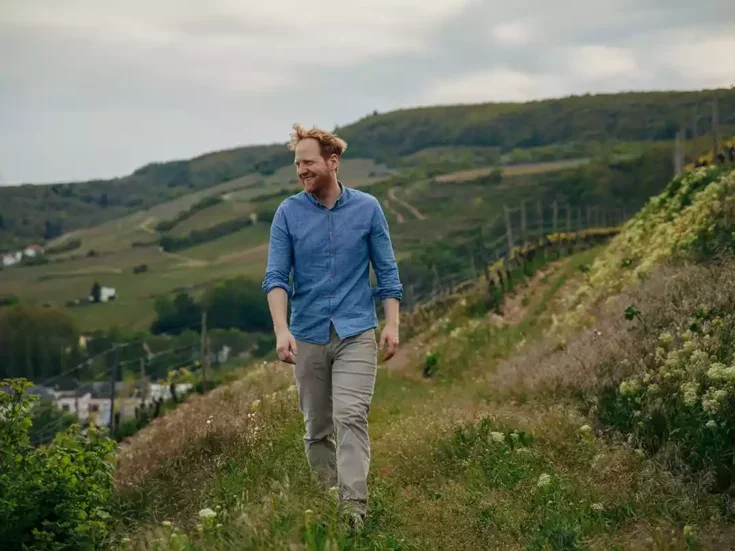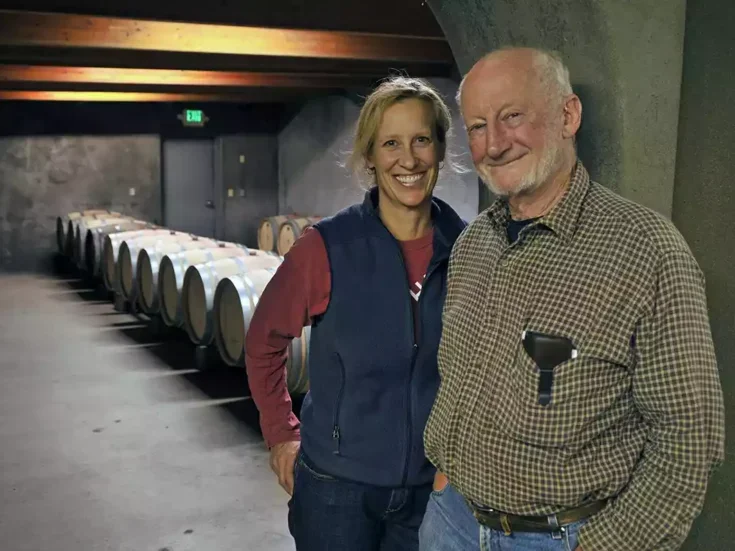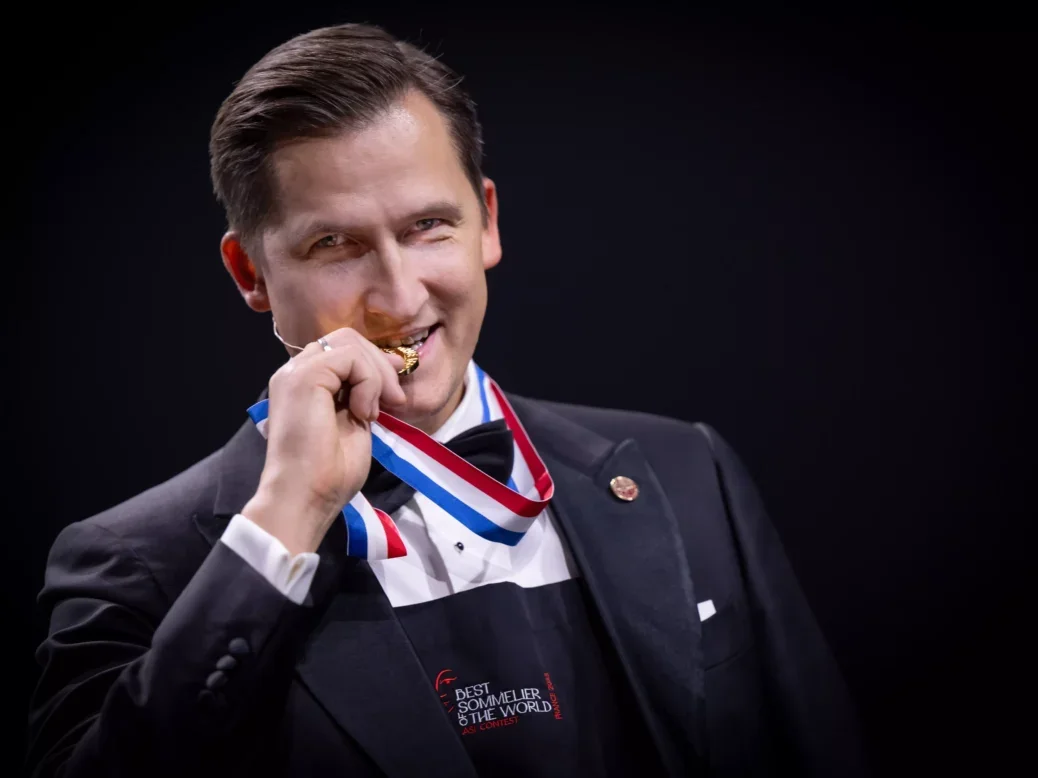
Essi Avellan MW reports from the ASI Best Sommelier of the World competition in Paris, won before a crowd of 4,000 spectators by Latvia’s Raimonds Tomsons.
February saw the ASI Best Sommelier of the World competition return to France after a break of 34 years. It had been 23 years since a French candidate (Olivier Poussier in 2000) won the coveted title. Thus, France had a lot to play for in both the organization of the event and the competition itself. The first ever female candidate for France, Pascaline Lepeltier, had immense pressure on her shoulders. She finished fourth under the eyes of 4,000 spectators at La Défense Arena in Paris. Despite the very strong female candidacy, it was to be another male winner. Latvian Raimonds Tomsons took home the trophy to a Baltic country for the first time.
The Association de la Sommellerie Internationale (ASI) was born from a gathering of visionary sommeliers in Reims, France in June 1969. Early on, the focus was not France but Europe. The very first Best Sommelier of the World competition was held the same year in Brussels, Belgium, yet was won by the French candidate, Armand Melkonian. Over the 50 years since, the association has become global, with member associations in 66 countries (of which five are for the time being observer members), the most recent countries joining including Vietnam, Ecuador, and Colombia.
Even if education is an increasingly important task for the ASI, its work culminates in the Best Sommelier of the World competition held at three-year intervals. The journey to this pinnacle of sommellerie may precede ASI Certificate examinations, national competitions, continental competitions and, most recently, special bootcamps as the ultimate preparation for the competition.
For the 2023 edition, 68 candidates representing 65 countries and three winners of continental contests (Europe and Africa 2021, Americas 2022, and Asia & Oceania 2022) gathered to compete for the crown for the 17th time. The organization was a tour de force by the ASI and the Union de la Sommellerie Française.
It was a four-day competition, advancing from quarterfinals and semifinals, all the way to the finals held on Sunday, February 12. The candidates went through high-level written tests, blind tastings, and service tasks aimed at putting them in professional situations to assess their skills and abilities. A high level of knowledge was required—as, for example, in the quarterfinals, when the candidates needed to answer questions like, “Where is the northernmost commercial vineyard in the world located and what is its name?” Or, “What is the sensory threshold for acetic acid in wine?”
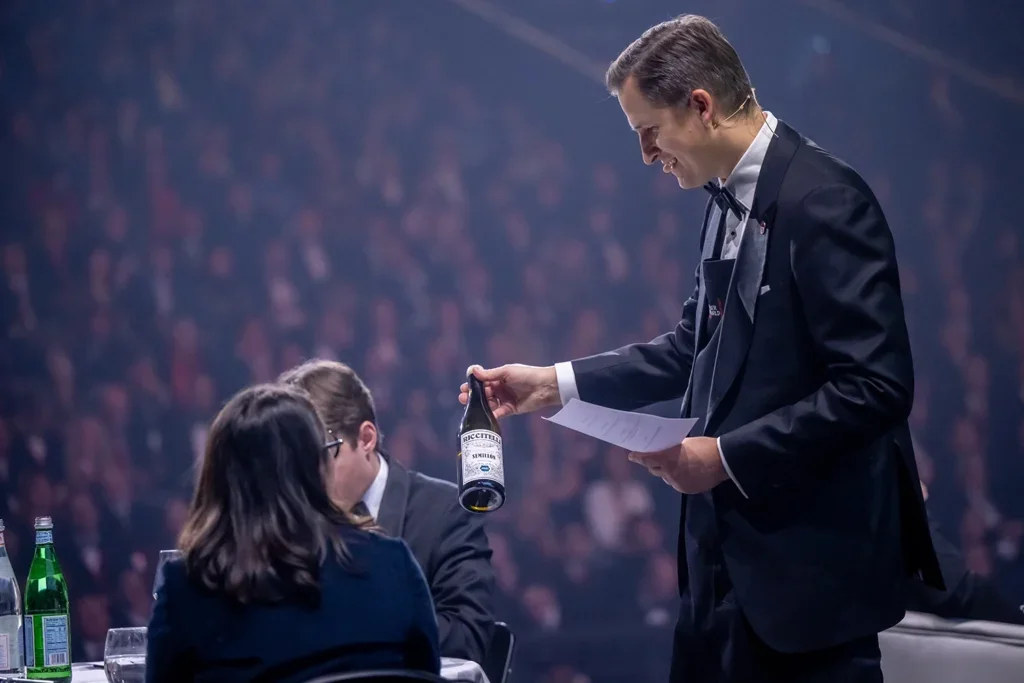
“Knowledge is the hardware, but human interaction is the software,” stated Andreas Larsson, in 2007 the first Best Sommelier of the World from Scandinavia. Thus, service tasks were tailored to test the candidates’ service acumen, quick reaction skills, and capability to act under stressful conditions. To make it even harder, but fairer, to all, no one is allowed to compete in their mother tongue and must choose between English, French, and Spanish.
The competition is getting tougher year by year, as the wine world is expanding. And it is not only wine and food-matching that the candidates need to master, but also beer, spirits, and non-alcoholic beverages—basically anything that can be consumed in a restaurant. This year’s semifinals tested the candidates in blind tasting non-alcoholic beverages, for which they also needed to give vegan menu pairings.
With the competition always including tricky and surprising sections, mental preparation is the key. “Over the six months preceding the competition, I didn’t study wine anymore,” the 2019 Best Sommelier of the World, Marc Almert of Germany, revealed. Instead, he used theater lessons, meditation, and visualization drills to finetune his performance. It all paid off, as he was one of the few to win the competition at the first attempt. Even the great, late Gérard Basset MS MW needed six attempts finally to win the trophy in 2010.
ASI Best Sommelier of the World: Semifinals to finals
The 17 semifinalists were announced on Thursday, February 9 at a reception held at the magnificent Hotel de Ville in Paris. The qualifiers were (in alphabetical order by country): Valeria Gamper (Argentina), Suvad Zlatic (Austria), Tom Ieven (Belgium), Reeze Choi (China), Sotiris Neofytidis (Cyprus), Nina Jensen (Denmark), Pascaline Lepeltier (France), Manuel Schembri (Iceland), Wataru Iwata (Japan), Raimonds Tomsons (Latvia), Chuan Ann Tan (Malaysia), Francesco Marzola (Norway), Andrea Martinisi (New Zealand), Jo Wessels (South Africa), Reza Nahaboo (Switzerland), Kai-Wen Lu (Taiwan), and Mark Guillaudeau (USA). In addition to the usual strong representation from Europe, Asia did particularly well, with four candidates making it to this stage.
On Friday, February 10, the candidates were again put to the test and, among other challenges, had to identify and assess an English sparkling wine. The blind-tasting task also tested them on three glasses of red Bordeaux that were later revealed to be the very same wine but aged in new oak barrels of different origins. Then they were asked to recognize the origins of the woods.
After the semifinals, it was a long, two-day wait for the candidates, as the three finalists were to be revealed on stage only on the final day. During this time, the key sponsors of the event gave high-level master classes on topics such as Dom Pérignon Champagne, Beaujolais, sake, and Macallan whisky.
Claiming the crown
The finals took place at La Défence Arena, which hosted close to 4,000 wine-loving spectators. Many more followed the excitement via live broadcasting. The show started with all 68 candidates marching onto the stage. The semifinalists remained on stage, and the jury called out the names of the semifinalists who didn’t make it to the final. The excitement was palpable, when there were four candidates left on stage, two male and two female. The hit was hard to the audience and the French organizers alike when Pascaline Lepeltier was announced in fourth position. After having competed well under huge pressure and media interest, she didn’t make it to the final, to the disappointment of just about everyone in the arena.
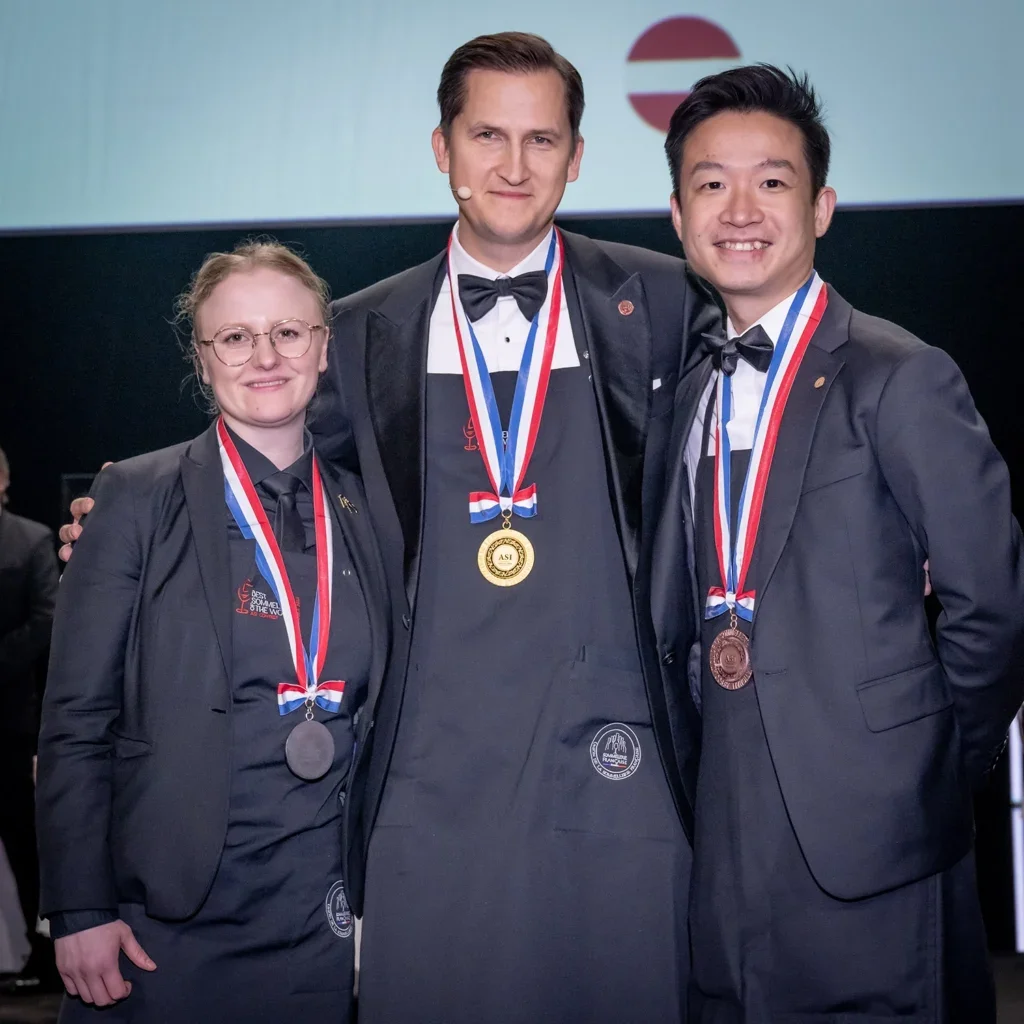
But it was time to celebrate the finalists—Reeze Choi of China, Nina Jansson of Denmark, and Raimonds Tomsons of Latvia. The trio went on to carry out several tasks on stage, which was decorated to resemble a restaurant. And the guests that they had to serve were quite something. In addition to numerous previous Best Sommelier of the World winners such as Arvid Rosengren, Marcus del Monego MW, and Olivier Poussier, the clientele included wine and gastronomy stars such as journalists Jeannie Cho Lee MW and Robert Joseph and chef Anne-Sophie Pic.
From a spectator’s viewpoint, the final seemed especially tight between Nina Jansson and Raimonds Tomsons. This duo also met each other in the finals at the previous competition in 2019, when Nina took second place ahead of Raimonds. This time, the service tasks went smoothly for both, yet neither thrived in the blind-tasting sections. Overall, Nina seemed the slightly stronger candidate to me, but Raimonds appeared to snatch more points in the wine list correction task.
Many were hoping for a first-ever female champion, but it was not yet the turn of a woman, despite two remarkably strong candidates. The fiercely competitive Raimonds Tomsons took the trophy to Latvia as the first-ever winner from a Baltic country. “I hope this victory will encourage young people in the Baltic and other countries not so famous for wine. I am sure Latvian hospitality industry will gain from it,” the new champion stated.
For Raimonds himself, the dream of the title was born in 2010, when he saw Gérard Basset win the trophy in ASI Best Sommelier of the World 2023Chile. The 2016 competition was another turning point in his own preparation, leading him to reach the finals in 2019. “Finishing third in Antwerp was a good but painful experience for me,” he recalled. Rather than giving up, Raimonds determinedly fought his way up onto the highest pedestal in Paris.
ASI Best Sommeliers of the World
2023: Raimonds Tomsons, Latvia (Paris, France)
2019: Marc Almert, Germany (Antwerp, Belgium)
2016: Arvid Rosengren, Sweden (Mendoza, Argentina)
2013: Paolo Basso, Switzerland (Tokyo, Japan)
2010: Gerard Basset, UK (Santiago de Chile, Chile)
2007: Andreas Larsson, Sweden (Rhodes, Greece)
2004: Enrico Bernardo, Italy (Athens, Greece)
2000: Olivier Poussier, France (Montreal, Canada)
1998: Markus Del Monego, Germany (Vienna, Austria)
1995: Shinya Tasaki, Japan (Tokyo, Japan)
1992: Philippe Faure-Brac, France (Rio de Janeiro, Brazil)
1989: Serge Dubs, France (Paris, France)
1986: Jean-Claude Jambon, France (Venice, Italy)
1983: Jean-Luc Pouteau, France (Brussels, Belgium)
1978: Giuseppe Vaccarini, Italy (Lisbon, Portugal)
1971: Piero Sattanino, Italy (Milan, Italy)
1969: Armand Melkonian, France (Brussels, Belgium)

